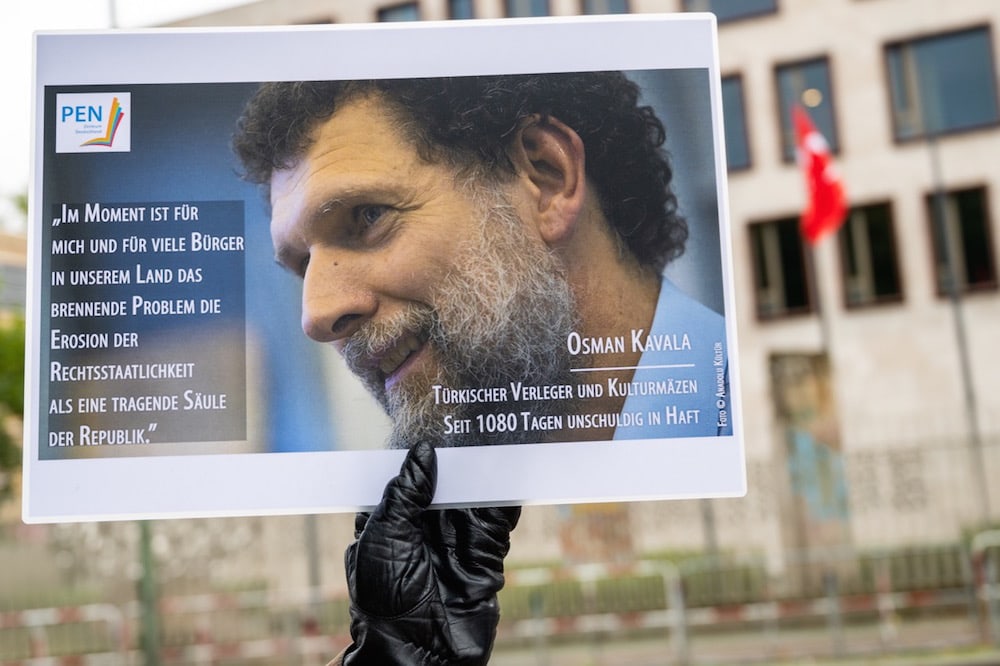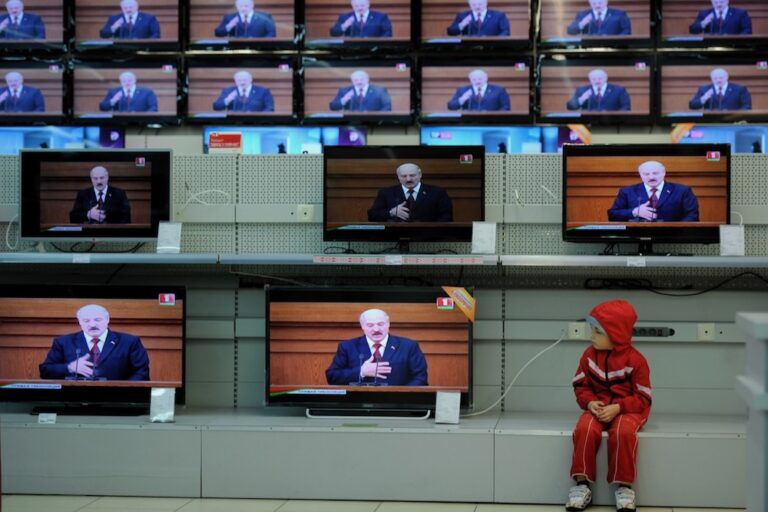December in Europe and Central Asia: A free expression round up produced by IFEX's Regional Editor Cathal Sheerin, based on IFEX member reports and news from the region.
The end of 2020 saw unjust, farcical decisions in the cases of Can Dündar, Osman Kavala and Selahattin Demirtaş, an escalation of international pressure on the rights-abusing regime in Belarus, a plea by a UN expert to President Trump to pardon Julian Assange and much more.
Draconian prison sentences and defying the ECtHR
The ongoing crackdown on the independent press and opposition voices in Turkey showed no sign of relenting in December, a month which saw important developments in several prominent cases and legislation passed that gives the government tighter control over civil society groups.
On 23 December, multiple IFEX members expressed their outrage as Can Dündar, former editor-in-chief of the daily newspaper Cumhuriyet, was sentenced in absentia to 27 years and six months in prison on spurious espionage and terrorism charges. The charges were based solely on his journalistic activities – specifically on his former newspaper’s story about the Turkish Intelligence Service’s involvement in the illegal transfer of arms to jihadist groups in Syria. The court issued a new arrest order with the verdict. Dündar lives in exile in Germany; the German Foreign Ministry has said it will not extradite him to Turkey.
On 22 December, the European Court of Human Rights (ECtHR) ruled that the jailed opposition politician, Selahattin Demirtaş, was detained for political reasons and that he should immediately be released. Demirtaş has been in pre-trial detention since November 2016 and faces an array of trumped-up terrorism-related charges based solely on his political statements. The Court held that Turkey had violated Demirtaş’s rights to freedom of expression and liberty and security, as well as his right to be elected and sit in parliament. President Erdoğan dismissed the ruling, saying that it was not binding on Turkey. This is not true: as a member of the Council of Europe, Turkey is obliged to abide by ECtHR rulings.
Turkey has also failed to abide by the ECtHR decision calling for the immediate release of jailed civil society leader Osman Kavala. Kavala has been behind bars for more than three years, initially held on charges related to the 2013 Gezi Park protests, but now on coup-related charges. On 18 December the Istanbul 36th High Criminal Court ruled to keep him in jail until the next hearing in his case in February 2021. Emma Sinclair Webb of Human Rights Watch and Caroline Stockford of Norwegian PEN gave damning statements about the decision.
On 29 December, Turkey’s Constitutional Court found that there was “no violation” of the right to liberty and security on Kavala’s ongoing detention.
On 27 December, Turkish lawmakers passed legislation that gives the authorities greater power to restrict the activities of NGOs. Although entitled the “Bill on Preventing the Spread of Weapons of Mass Destruction,” most articles in the legislation focus on civil society groups. The Ministry of Interior will now be able to replace NGO leaders who are prosecuted on “terrorism” charges with new members and suspend the activities of groups. The Council of Europe’s Commissioner for Human Rights Dunja Mijatović had urged the Turkish parliament to drop the draft law.
YouTube became the first international social media platform to submit to Turkey’s recently amended internet law. On 16 December it announced that it would “set up a legal entity in Turkey to serve as a local representative, providing a local point of contact for the government”. ARTICLE 19 and Human Rights Watch criticised the decision, warning that not only did it set a “dangerous precedent” (making it harder for other tech companies to refuse to appoint a local representative), but that it would “inevitably lead to an increase in arbitrary censorship, compromise people’s privacy and right of access to information, and could implicate YouTube in human rights violations”.
Sanctions, international condemnation and a criminal investigation
While the authorities continue to target independent press and opposition voices in Belarus, international pressure on the regime is escalating.
December saw:
- a further round of EU sanctions imposed on “high-level officials responsible for the ongoing violent repression”;
- sanctions imposed by the International Olympic Committee – including a ban on President Lukashenka attending the Olympic Games – because the Belarusian National Olympic Committee had not “appropriately protected… Belarusian athletes from political discrimination”;
- a criminal probe launched by Lithuania against Belarusian regime officials over alleged torture of detained opposition activists;
- 42 states at the Human Rights Council (HRC) session on Belarus condemning the authorities’ repression of the independent press and calling for the implementation of the OSCE Moscow Mechanism report recommendations on freedom of expression and the media;
- the launch of an online platform – an initiative of opposition leader Svetlana Tikhanovskaya – to collect evidence that will be used in future prosecutions of those who are implicated in the regime’s human rights abuses.
IFEX members continued to press for justice in Belarus. PEN America and PEN International collaborated on a statement with PEN Belarus, which the president of that centre, writer Svetlana Alexievich, delivered via video at the aforementioned HRC session. PEN America also launched a series of video statements by prominent US politicians expressing solidarity with those targeted by the Belarusian regime.
Promoting awareness of the events in Belarus, Reporters Without Borders published videos of interviews with three Belarusian journalists: Natalya Lubneuskaya, Ihar Karnei and Marina Zolotova, the editor of popular news website TUT.by.
This month, ARTICLE 19 continued to add to its own series of videos of interviews with rights activists and members of the independent media.
On Human Rights Day (10 December), IFEX members issued a joint public statement calling on Belarus to end the persecution of press, activists and the cultural sector, adhere to all recommendations contained in the OSCE Moscow Mechanism report, and allow the UN Office of the High Commissioner for Human Rights and relevant Special Procedures mandate holders access to the country.
In late December, the Polish Association of Journalists, in cooperation with the National Union of Journalists of Ukraine, the Belarusian Association of Journalists and the European Federation of Journalists launched an online book entitled I am a journalist. Why do you beat me?, which, via interviews with Belarusian journalists, documents the regime’s persecution of independent media.
Gender focus
In Romania, the Constitutional Court overturned a June 2020 law that banned “activities aimed at spreading gender identity theory or opinion” in educational institutions. The law defined “gender identity theory” as a belief that “gender is a concept that is different than the biological sex and the two are not always the same.” Gender is widely accepted to be a social construct, rather than biologically determined (as the June 2020 law would have it). The legislation had been heavily criticised by rights groups. Human Rights Watch’s Cristian González Cabrera said of the law:
“A ban on discussing gender in education settings would unjustifiably limit students’ and teachers’ rights to free expression and to information, including about gender. The law also threatened the right to health, particularly for transgender, non-binary, and intersex children, for whom denying access to information about gender could have pernicious physical and mental health consequences.”
In Hungary, lawmakers voted to change the constitution so that same-sex couples are effectively banned from adopting children. Under the new legislation, only heterosexual married couples (same sex marriage is not allowed in Hungary) can adopt. Single people will still be able to apply to adopt, but will have to seek special permission from the ultraconservative Family Affairs minister Katalin Novak.
The Council of Europe Commissioner for Human Rights, Dunja Mijatović, called on Poland this month to reverse the current trend of homophobia that is rife in both Polish politics and the wider society. “Public officials and opinion makers should stop promoting an atmosphere of hate and intolerance vis-à-vis LGBTI people,” she said, “and instead, improve respect for their human rights. Stigmatisation and hate speech carry a real risk of legitimising violence. LGBTI are people, not an ideology”. Poland’s ruling right wing Law and Justice Party (PiS) has for years openly promoted homophobia and misogynistic attitudes and policies, including the creation of so-called “LGBT-free zones” (which currently cover approximately one third of the country).
In Brief
Nils Melzer, the UN Special Rapporteur on torture and other cruel, inhuman or degrading treatment or punishment, this month made a public plea to US President Donald Trump to pardon Wikileaks’ founder Julian Assange. Whistleblower Assange, currently detained in the UK‘s Belmarsh Prison, faces up to 175 years in prison should he be convicted in the US on espionage charges.
On 4 January 2021, a British judge rejected a US extradition request, on the grounds that the conditions of detention in the US would create a suicide risk for Assange; on 6 January Assange’s bail request was rejected.
On the 38-month anniversary of the murder in Malta of journalist Daphne Caruana Galizia, IFEX members and other press freedom groups called publicly on PM Abela to end his government’s attempts to undermine the independent inquiry into the circumstances surrounding the journalist’s death. Their statement came two weeks after the Council of Europe’s special rapporteur, Pieter Omtzigt, published his follow-up report on corruption in Malta and Caruana Galizia’s murder. Omtzigt said that Malta’s implementation of the Parliamentary Assembly of the Council of Europe’s recommendations on achieving justice for the murdered journalist had been “fundamentally unsatisfactory”. He also said that the Maltese government (which is a subject of the inquiry) should not “impose an arbitrary deadline on its work, or criticise its activities”.
As expected, the EU adopted a global human rights sanction regime (its own Magnitsky Act), allowing it to “target individuals, entities and bodies – including state and non-state actors – responsible for, involved in or associated with serious human rights violations”.
As the movement towards tackling Strategic Lawsuits Against Public Participation (SLAPPs) gathers momentum, IFEX members and other press groups published a proposal for EU legislation that will protect journalists from these cynical, gagging suits.
On 16 December in France, a court found fourteen people guilty of involvement in a series of attacks carried out by Islamic terrorists in 2015, including the mass shooting at the offices of Charlie Hebdo magazine in Paris. Days later, four men were charged with taking part in a terrorist conspiracy in connection with the September 2020 stabbing of two people by an Islamic extremist outside Charlie Hebdo’s former offices. The main suspect, who was arrested following the attack, reportedly told police that he was motivated by the magazine’s republishing of cartoons of the prophet Muhammad.
Also in France, December saw further mass protests against the so-called “Global Security” bill, which, if passed, would outlaw taking photos of police with malevolent intent. In November, in the face of massive demonstrations by citizens and protests by IFEX members and other press freedom groups, lawmakers said they would rewrite the section covering the taking of photos. However, UN special rapporteurs said in December that the bill is “incompatible with international human rights law, and should be comprehensively revised”.



